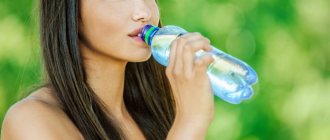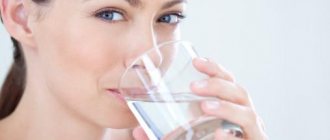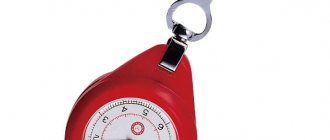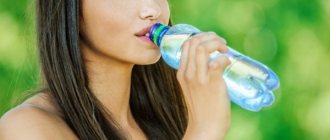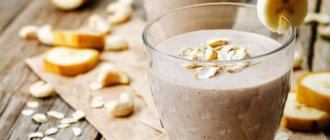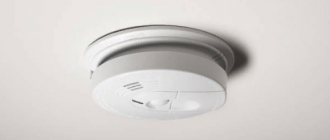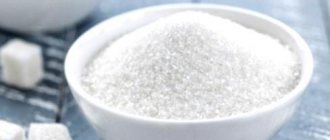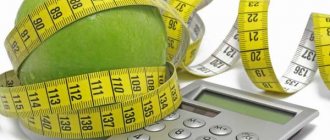How many liters of water should a person drink per day? If you are interested in the answer to this question, then you have come to the right place. An article about water without water (but if only a little).
Water is essential for human life. It comes in second place in importance, the first, of course, being oxygen. However, the topic of water balance in the body is surrounded by complete myths.
Nutritionists, fitness experts, “experts” in healthy lifestyles carry most of the myths from blog to blog, from book to book. This is beneficial for them. So how much water should you drink per day and how to do it correctly?
By the way, at the end of the article (before the conclusion) you will find a small test with which you can test the knowledge you have learned today.
The main myth about water balance
How many glasses of water should you drink a day? For years we have been constantly told that the body is dehydrated. And for optimal body function, you need to drink at least 8 glasses of water a day.
But some advisers went further: they advise drinking 2.5-3 liters per day. And the reward for such a daily feat is healthy skin and prolongation of youth. No, you definitely don’t need to force yourself to drink such a huge amount of liquid.
The birthplace of this myth is the USA. Answering the question of how much water to drink per day, back in 1945 the US National Research Council stated that an adult should consume 1 ml of water for every calorie of food. And this gave a total of up to 2.5 liters per day for men and up to 2 liters for women.
After so many years, few people are trying to dispel the myth. However, current experts missed an important detail: the National Research Council also said that most of the norm is already contained in food .
We get approximately 1.5 liters with any liquid and another liter as a component of any food, that is, it is not necessary to drink water in its pure form, it is in every product.
According to The USDA National Nutrient Database for Standard Reference, these foods have the following water content.
Water needs of an adult
How much water should a person with a standard build and minimal physical activity drink per day? In addition to these two parameters, for an accurate calculation it is necessary to take into account the age category of the person. The fact is that with age, the cells and tissues of the body intensively lose water. If in youth its percentage is 97%, over time this figure decreases to 57%. Wrinkles appear on the face and body, the body slows down metabolism. In fact, the situation is similar to the classic symptoms of dehydration.
How much water should you drink per day to avoid such troubles? The average rate does not reflect individual needs. This is just a guideline that allows you to provide the body with the necessary minimum of fluid. Moreover, you need to take into account the mass of fruits, some of which contain up to 90% water, and the soups, coffee, tea that you consume. How much water should you drink per day for proper metabolism, removal of toxins, and improvement of overall well-being? Cardiologists are sure: for an absolutely healthy person, the standard should be about 1.5 liters per day with a salt intake of up to 1.5 g.
How much water should you drink per day
But if not 8 glasses, then how many? Individual hydration needs depend on personal parameters: weight, height, environmental factors, level of physical activity, and so on.
Fortunately, a person does not need to constantly worry about carefully monitoring any of these parameters. The body already has built-in mechanisms to maintain optimal water balance.
For example, when the body detects that there is not enough fluid, it releases an antidiuretic hormone - vasopressin . It increases water absorption in the kidneys and returns to the bloodstream to restore balance. But when this is not enough, the body turns attention to itself and makes you feel thirsty . Surely you will react and drink a glass of water.
World Health Organization (WHO) expert Bruce Gordon shares the same opinion. He spoke about this in an interview with RIA Novosti, an excerpt of which is presented below.
At the end of the interview, Bruce Gordon advised people to listen to their bodies and relax about their drinking habits.
But if you drink 2-3 liters of water, you can live longer
There is no scientific evidence to support the false claim that 2.5 liters of water per day increases life expectancy. A study was conducted in the Netherlands for about 10 years, in which over 110,000 volunteers took part.
The results were published in the British Journal of Nutrition: scientists did not find any direct connection between fluid intake and causes of mortality. People who drank a lot of water and those who drank little died from the same diseases.
There is also not enough evidence to suggest that drinking more water than our bodies require provides any benefit.
Some people think that you need to drink water according to your weight. This is partly true, but as we have already said, most of the norm is found in food, and weight is not the only factor. In such a situation, the amount of liquid entering the body is difficult to calculate and you need to rely on thirst.
Why you need to trust your body
Beverage manufacturers actively continue to instill in people the rule of two liters or eight glasses a day. Not surprising, because selling the fear of dehydration is very profitable.
The human body consists of two-thirds water, it performs many important functions, so you can’t do without it. But it is worth remembering that a person does not need more water than his body requires .
Until recently, humans and almost all land animals had to develop and adapt in conditions of inconsistent access to water. Therefore, a system for maintaining fluid balance was a necessity, especially in drought conditions.
These are different times. But your body still sends you signals using a handy and virtually fail-safe tool to measure dehydration: thirst. If you want to drink, drink. It's simple.
What happens if you drink a lot of water
Is it possible to drink too much water? Although this sounds fantastic, it is really possible. Excessive water consumption can lead to so-called water intoxication , in which there is a serious decrease in the concentration of sodium in the blood (hyponatremia).
Symptoms of hyponatremia can range from nausea and confusion to seizures and even death in severe cases.
However, cases of water intoxication are quite rare. Those most at risk are professional long-distance runners who lose track of how much water they drink during a race, and small children learning to swim. Due to inexperience, the latter can “swallow” in the pool and suffer from loss of electrolytes.
What happens if you drink little water
- Weakness. If a person does not receive enough fluid, most processes in the body begin to slow down. As a result, a person begins to feel weak and quickly gets tired.
- Aging. Drinking enough fluids will help your body fight free radicals, which are known to damage cells and lead to premature aging.
- Overweight. Water itself does not in any way contribute to weight loss, but it helps cleanse the body of toxins and waste, which will subsequently have a positive effect on your figure. And sometimes the body confuses the feeling of thirst and hunger. Therefore, if you want to have a snack (namely a snack, a strong feeling of hunger and the desire to chew something can be easily distinguished), drink a glass of water.
Is it bad to have too much?
Those of us who strive to drink eight glasses a day won't do ourselves any harm by doing so. But believing that we need to drink even when our bodies aren't sending us the appropriate signals can lead us into dangerous territory.
Drinking too much fluid can sometimes cause low sodium levels in the blood. This can lead to swelling of the brain and lungs as the body tries to restore sodium levels.
Image copyright Getty Images Image caption Many of us are often moderately dehydrated and don't notice it
Over the past ten years, Courtney Kipps has witnessed at least 15 athletes die from overhydration during athletic competitions.
She believes that such cases were partly the result of our lack of faith in our own body, in its ability to self-regulate.
“Nurses and doctors in hospitals can see patients whose bodies are severely dehydrated and have been without water for a long time. But this is not at all what happens to marathon athletes,” she emphasizes.
Joanna Pakenham ran the London Marathon in 2020, the hottest year in terms of weather conditions. However, she simply does not remember most of the distance, since she drank so much water that she developed overhydration and hyponatremia. She was taken to the hospital that same day.
“My girlfriend and my partner thought I was dehydrated and gave me a huge glass of water to drink. I fainted, my heart stopped. I was flown by helicopter to the hospital and remained unconscious from Sunday evening until Tuesday,” she recalls.
Image copyright BBC/Getty Image caption We don't often think about it, but too much fluid can also be harmful to the body
Pakenham, who plans to run the marathon again this year, said the only advice she heard from friends and read on marathon posters was to drink more water.
“All I had to do was take a few electrolyte tablets, which raises the sodium level in the blood,” she says. “I was a participant in several marathons, but I didn’t know this.”
“I want people to know that even something so simple can be deadly.”
How to track dehydration: signs
If you're really concerned about hydration and want to track it, there's a home method. It may not be the most pleasant: check the color of your urine . Normal urine is colorless or light yellow. A dark yellow or sandy color may indicate dehydration.
Of course, dark color can also signal more serious problems. Therefore, balance testing should only be done if there are no other diseases.
Possible symptoms of dehydration:
- eyes itch;
- lips become dry and rough;
- headache or dizziness appears;
- fast fatiguability;
- rare urination;
- Well, and the banality - my mouth was dry.
How to know how much water to drink
Doctors identify two key signs Nutrition and healthy eating that you have enough fluid:
- You don't feel thirsty.
- Your urine is colorless or light yellow.
It's like that? This means you can relax: everything is fine with your drinking regime, there is no need to fill yourself with additional volumes of liquid (even if you or someone else thinks that you are not drinking enough).
If at least one of the signs is present, you should consciously add a glass of water, compote, fruit drink or juice between meals: drinks will reduce the likelihood of dehydration.
The prospect of dehydration should be approached especially carefully if you are included in one of the following risk groups Nutrition and healthy eating:
Do you engage in physical labor or sports?
Any activity that makes you sweat is an obvious reason to drink an extra glass of water before, during, or after it, even if you don't feel like it.
You are in a high altitude or hot, dry climate
These environmental parameters cause you to sweat intensely (although the sweat may not be externally noticeable due to intense evaporation) and, accordingly, lose more fluid than usual. Losses require compensation: do not forget to carry a bottle of water with you and sip from it regularly.
You have a fever and/or vomiting or diarrhea
The higher the temperature, the more moisture the skin and the body as a whole lose (evaporate). Dehydration in this case is extremely dangerous because it increases. The more fluid the body loses, the less the body’s ability to resist disease, the higher the temperature. This means that moisture loss increases again.
Therefore, in such conditions, doctors recommend drinking as much as possible. This includes using oral rehydration solutions, which retain water and prevent dehydration.
You are pregnant or breastfeeding
The US Office of Women's Health recommends Healthy eating and women that pregnant women drink at least 10 cups (2.4 liters) of fluid, and breastfeeding women drink at least 13 cups (3.1 liters) daily.
What can't quench your thirst?
There are drinks with the opposite effect. That is, they seem to quench your thirst, but later they take in double the amount of water, again increasing the desire to drink and dehydration. These include: coffee, soda, tea.
Read more about the harm caused by coffee, in what quantity and when to drink it in a separate article.
Tea and coffee contain caffeine (of course, coffee has more). First we drank one of these drinks and seemed to quench our thirst. Caffeine dilates blood vessels and constricts the vessels of the kidneys, and after half an hour everything turns on exactly the opposite and a diuretic effect . In proportions 1 to 2, that is, I drank 1 cup of strong coffee or tea, and it turned out 2.
There has been a lot of debate lately about whether these drinks cause dehydration or not. For now, we can draw this conclusion: don’t get carried away with these drinks and drink more plain water.
What about soda?
With soda, things are different. You've probably often heard that lemonade or soda cannot quench your thirst. So, they quench thirst, but because of sugar, the human body cannot understand whether it has enough water or not, so it becomes thirsty. How does it all happen?
Sugar penetrates the body very quickly and is absorbed, literally in 5-10 minutes. After this, the concentration of sugar around the cells increases and water begins to leave them.
As a result, a signal is sent to the brain that there is not enough water in the body and it is necessary to restore the water balance. Therefore, although sweet drinks are drunk more readily, it is impossible to quench thirst with them.
Also interesting:
- 5 things you shouldn't do in the morning
- How not to damage your eyesight when using a smartphone
Other water sources
We discussed the importance of drinking enough water every day: at least 10 glasses of 200 milliliters each is the standard for drinking. That is, you need to consume at least one and a half liters of liquid.
However, you should not assume that the moisture the body needs can only be obtained from water.
In fact, you can get water from a whole host of other foods and drinks throughout the day that you may not have even thought about.
Let's take a closer look at the most common options, by consuming which you can get a sufficient daily amount of water without any additional effort.
In general, we get up to 20% of the required daily fluid from regular food.
Some foods, however, are richer in liquid than others.
Obviously, these are fruits and vegetables, such as arbus or spinach, both of which consist of 90% water by weight.
Other foods such as meat, fish and eggs also contain water.
In addition, you may not have even thought about it, but what you drink during the day (except water) also provides you with some part of the required daily requirement.
For example, if you drink a glass of juice in the morning or a glass of milk before bed, you will consume some water, since both of these drinks consist of a significant portion of it.
You may not have even thought about the fact that beer, wine, tea, coffee and coffee-based drinks also contain water.
However, before replacing water exclusively with these drinks, you need to pay attention to the other components they contain, such as caffeine, sugar and various chemicals.
However, research shows that coffee and tea (both of which have diuretic effects) are also effective in maintaining fluid balance in the body, since the diuretic effect of these drinks is relatively weak.
Does water temperature matter?
Many people have probably heard that cold water can help you lose weight. So, there will be almost no result in this direction from drinking cold liquid.
There was a doctor from the University of Southern California who proved that by warming cold water in the stomach, the body loses almost no calories . The tiny amount of calories that are lost during this process does not affect anything. The scientist's name is Roger Clemens.
Cold water not only has no benefits, but can also cause harm.
- Low temperature water can damage tooth enamel.
- Cold water satisfies thirst worse than warm water.
- Harmful to the stomach if you drink it after eating fatty foods . Because of it, the fat that enters the stomach is not digested. Further, moving into the large intestine, it can cause disorders. And the stomach itself strives to get rid of the cold, its walls contract, pushing not only fat, but also all poorly digested food further into the intestines, where it simply rots. At this moment, the brain does not receive a signal that the person is full and you begin to eat even more.
It is on the latter principle that all fast foods are based, which include only iced drinks in combination lunches at a competitive price.
Does water help you lose weight?
Nutritionists recommend that each of their clients, in addition to a proper diet, consume a sufficient amount of liquid. It helps normalize metabolism. This way, all nutrients are absorbed more correctly and fat deposits accumulate less. Losing weight with water occurs due to:
- satisfying hunger;
- skin tightening;
- elimination of edema;
- normalization of digestion;
- improving mood and performance.
Why you should drink water when losing weight
Liquid is one of the important components of the biochemical processes of fat processing in the body. Only those cells that are saturated with moisture can dissolve fat. With intensive weight loss, the problem of sagging skin is relevant. In order for it to remain elastic, moisture is also needed. In addition, a person often confuses the feelings of hunger and thirst, which is why he eats more than necessary. With enough fluid, overeating does not occur. For this reason, you can drink water and lose weight.
How water helps you lose weight
Scientists have proven that a person begins to gain weight in most cases due to insufficient fluid. In the slagged body of obese people, the amount of feces can reach 7 kg. fat Drinking water for weight loss triggers the mechanisms of cleansing of these waste products, and also speeds up your metabolism and the breakdown process. With a lack of moisture, lymph and blood thicken, which is why substances cannot rise through the vessels. This is where swelling appears, and swelling leads to cellulite. If you drink the required amount of water, the orange peel will go away.
- Analysis for immune status
- How to write a resume for a job - sample
- English elastic knitting
Should you drink water in the morning on an empty stomach?
Is it healthy to drink one glass of water (or two) on an empty stomach? Yes, it's useful.
The Japanese have a useful habit: drinking a glass of water in the morning on an empty stomach. This is probably one of the many factors due to which the Japanese are leaders in the ranking of centenarians.
According to the source, the average life expectancy in Japan is 81 years for a man and 87 for a woman. While in Russia these figures are 66 and 77, respectively.
Water drunk on an empty stomach helps us wake up and starts metabolic processes in the body. Cleanses the body of toxins, promotes weight loss, improves immunity, thereby providing protection against infections.
Main:
- Drink warm water, at room temperature.
- After drinking a glass of water, you need to be patient and not eat for 20-40 minutes. During this time, water exhibits its healing properties; you can prevent this by eating.
- Drink a glass of water as soon as you wake up. More precisely: we woke up, brushed our teeth and drank water.
- It should be plain water, no juices.
- And, of course, don’t forget to drink water throughout the day.
Drinking a glass of water on an empty stomach seems easy, but what a huge effect this healthy habit gives. In the near future you will notice improvements in your body.
You might be interested in: Water with lemon on an empty stomach is a great combination to start a productive day.
Tips for determining your daily water intake
You already have a figure for how much water you should drink per day, but how do you know you're drinking the right amount?
It may seem daunting at first, especially if you're not used to drinking so much, but if you use the tips below, you'll find it's not that difficult:
- Drink 2 glasses: If you drink 2 glasses before each meal, you will eat less. Science has definitely established this fact, and it’s better not to argue with science! Drink 2 glasses before meals and you will feel more full. This means you'll eat less and be able to lose more weight. And if you do this before each of your three meals, that means you're almost halfway toward your fluid intake goal.
- Every morning and evening: Make it a habit to drink a glass of water before you go to bed and another glass of water every morning when you wake up. Science has found that a glass of water before bed helps supply internal organs with water at night, which is especially important. By staying true to this habit, you will also get closer to your fluid intake goal.
- Measuring containers: One way to track your fluid intake is to buy a bottle and use it exclusively for drinking. For example, if you use a half-liter bottle and your daily water intake is 2500 milliliters, then you will need to fill it five times during the day.
- Tastes: Sometimes drinking the same water day after day gets boring. If you want to add some variety to your drink without adding extra inches to your waist, try adding sliced lemon, strawberries or lime to your water. This will brighten up your fluid intake while leaving the number of calories unchanged.
- Bubbles: If you want to further spice up the contents of your glass, why not add some sparkle to it and make it fizzy? You might find some interesting zero-calorie water on sale. Remember: hydration doesn't have to be boring, experiment! Some people get soda machines to make their own carbonated drinks.
When to drink water
Of course, we have already said that you need to drink water when you want it. But there are certain times when drinking a glass of water will provide the greatest benefit.
- Drink water after waking up. The previous paragraph is devoted to this issue.
- Drinking a glass of water 30-60 minutes before meals helps digestion.
- 1.5-2 hours after eating, also promotes digestion.
- When you feel hungry, as the body can confuse thirst with hunger.
- Drinking a glass of water before taking a bath will help lower your blood pressure.
- You can also drink water before bed - this will reduce the load on the heart, which will help reduce the risk of a heart attack and promote better sleep.
Fun fact: Drinking a glass of water before bed every day can reduce your risk of having a heart attack while you sleep by 95%.
What kind of water to drink
- Boiled water is the most economical way to satisfy your thirst. During boiling, microbes die, chlorine evaporates, and excess salts settle at the bottom of the kettle, breaking it every six months (if we are talking about an electric kettle). But if the water contains few salts, then boiling is not the best source of pure water.
- You can drink purchased water ; most likely, all proportions and rules are observed in it (we are talking about good manufacturers). But not every person or family can afford to spend the budget on buying water. Therefore, people are starting to think about installing a filter.
- Important: the filter should not be with a reverse osmosis system . These make almost distilled water, that is, they strip it of any impurities. And such water is the best solvent and, according to research by the World Health Organization, including in Russia, it flushes calcium and salts from the body, leading to problems of the joints, heart, exacerbation of ulcers, and anemia.
It is best, in terms of economy and benefits, to drink filtered water (this is the author’s opinion). If you think differently or notice an error, write about it in the comments.
Drawing the line
| Brief excerpt from the article |
| Most of the water enters the body with food. |
| The amount of water consumed depends on the characteristics of the body. |
| Low or high water consumption has negative consequences. |
| Tea, coffee and soda will not quench your thirst. |
| It is better to drink water at room temperature; |
| Drinking a glass of water on an empty stomach will be very beneficial for your body. |
Now I’ll repeat what was said at the beginning of the article, our body already has built-in mechanisms that allow us to feel approaching dehydration. So drink whenever you want, as long as you don't experience symptoms of dehydration during the day.
Otherwise, you will need to drink more than usual. And also pay attention to the seventh point, the tips indicated there will help you avoid dehydration.
Every year there are many studies and statements related to maintaining water balance in the body. Based on this, the article will be updated periodically. If you suddenly found some material before us, write about it in the comments.
Was there anything you didn’t like about this article, do you have anything to add, or did you find an error? Be sure to write about it in the comments. Not a single comment will be left unattended!
Material updated 05/22/2020 at 02:25
How to accurately calculate the daily dosage of drinking water
Today, anyone can calculate their fluid intake per day online. When asked how to calculate the amount of water needed daily, experts advise taking into account the following factors:
- Weight. A heavier person should drink more than a lighter person.
- Environment. The amount of liquid directly depends on climatic conditions. In the summer, when it’s hot, we drink more than in the winter.
- Physical activity. A sedentary person drinks much less than someone who plays sports or experiences other physical activity.
A special online calculator that takes into account all of the above factors will indicate the required amount of liquid to drink. The final calculations indicate the dosage of only plain clean water in liters, and tea, juices, coffee, soups, and dairy products are not taken into account.
It should be remembered that water is an excellent assistant in losing weight; it helps dull the feeling of hunger, which is easily confused with thirst. A normal amount of daily fluid intake fights the appearance of cellulite and also saves the skin from dryness and flaking.
